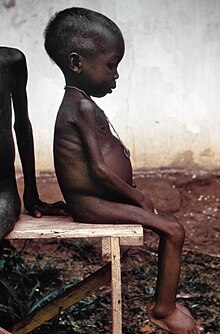Doktor Tanpa Sempadan
| Médecins Sans Frontières (Doktor Tanpa Sempadan) | |
|---|---|
| Médecins Sans Frontières logo | |
| Maklumat am | |
| Jenis | Organisasi kemanusiaan perubatan |
| Ibu pejabat | Geneva, Switzerland |
| Penubuhan | |
| Identiti | |
| Laman sesawang | http://www.msf.org http://www.doctorswithoutborders.org |
sunting  | |
Doktor tanpa sempadan, atau Médecins Sans Frontièrescode: fr is deprecated (MSF) (pronounced [medəsɛ̃ sɑ̃ fʁɔ̃tjɛʁ] (![]() dengar)), adalah organisasi bukan kerajaan bantuan kemanusiaan sekular yang terkenal kerana projeknya di wilayah yang bergolak dengan kancah perperangan dan negara membangun menangani wabak penyakit. Ibu pejabatnya terletak di Geneva, Switzerland.[1] Organisasi ini dikenali di kebanyakn tempat di dunia dengan nama Perancisnya atau secara ringkas MSF, hanya di Kanada dan Amerika Syarikat nama Doktor tanpa sempadan (Doctors Without Borders) biasa digunakan.
dengar)), adalah organisasi bukan kerajaan bantuan kemanusiaan sekular yang terkenal kerana projeknya di wilayah yang bergolak dengan kancah perperangan dan negara membangun menangani wabak penyakit. Ibu pejabatnya terletak di Geneva, Switzerland.[1] Organisasi ini dikenali di kebanyakn tempat di dunia dengan nama Perancisnya atau secara ringkas MSF, hanya di Kanada dan Amerika Syarikat nama Doktor tanpa sempadan (Doctors Without Borders) biasa digunakan.
Ahli medical yang bertugas di 70 negara membantu mengedarkan atau memberi perkhidmatan perubatan dan apa-apa lagi pertolongan berkaitan kesihatan kepada penduduk-penduduk negara yang berada dalam kesusahan tanpa mengira rupa, warna kulit, bangsa, agama dan kepentingan politik.
Pada tahun 2007 lebih 26,000, kebanyakannya tempatan, doktor, jururawat, dan profesion perubatan lain, pakar logistik, jurutera air dan kumbahan, dan pentadbir memberikan bantuan perubatan di lebih dari 60 negara. Penyumbang peribadi memberikan lebih 80% bagi dana organisasi, sementara kerajaan dan korporate memberikan bakinya, memberikan MSF belanjawan tahunan sekitar US$400 juta.[2]
Médecins Sans Frontièrescode: fr is deprecated dicipta pada tahun 1971 oleh sekumpulan kecil doktor Perancis dan wartawan selepas Perasn Saudara Nigeri (perpecahan Biafra), yang mempercayai bahawa semua manusia berhak menerima rawatan perubatan tanpa mengira bangsa agama, kepercayaan, atau hubungan politik, dan keperluan manusia melebihi peraturan persempadanan antarabangsa.[3]
Dokumen teras melakar prinsip MSF adalah Charter[4] and the Chantilly Principles, along with the later La Mancha Agreement,[5] yang dalam Peraturan, Seksyen 2 addresses governance. MSF has an associative structure, where operational decisions are made, largely independently, by the 5 operational centres (Amsterdam, Barcelona-Athens, Brussel, Geneva and Paris). Common policies on core issues are coordinated by the International Council, in which each of the 19 sections (national offices) is represented. The International Council meets in Geneva, Switzerland, where the International Office, which coordinates international activities common to the operational centres, is also based.
]</ref> The current president of MSF is Dr. Unni Karunakara.
MSF should not be confused with Médecins du Monde (Doctors of the World, in English). The latter organization was formed in part by members of the former organization, but it is an entirely independent non-governmental organization with no links to MSF today.
>
Ciptaan
Biafra

Rujukan
- ^ "About MSF." Médecins Sans Frontières. Retrieved on 31 August 2011. "MEDECINS SANS FRONTIERES - Rue de Lausanne 78 - CP 116 - 1211 - Geneva 21"
- ^ Forsythe, David P. (2005) The Humanitarians: The International Committee of the Red Cross, Cambridge University Press. ISBN 0-521-61281-0.
- ^ (Perancis) "La création de Médecins Sans Frontières". Médecins Sans Frontières (Doctors Without borders). La création de Médecins Sans Frontières. Dicapai pada 14 September 2011.
- ^ MSF Article MSF's Charter – ABOUT MSF – MSF UK MSF. Retrieved 31 May 2009.
- ^ MSF Article La Mancha Agreement MSF. Retrieved 31 May 2009.
Bacaan lajut
- Bortolotti, D (2004). "Hope in Hell: Inside the World of Doctors Without Borders". Firefly Books. Buffalo, N.Y.: Firefly Books. ISBN 1-55297-865-6.
- Greenberg KS (2002). "Humanitarianism in the Post-Colonial Era: The History of Médecins Sans Frontières" (PDF). The Concord Review. (links to PDF file)
- McCall M, Salama P (1 September 1999). "Selection, training, and support of relief workers: an occupational health issue". British Medical Journal. 318 (7176): 113–116. PMC 1114577. PMID 9880288.
- Zwi AB (2004). "How Should the Health Community Respond to Violent Political Conflict?". PLoS Medicine (online). 1 (1): e14. doi:10.1371/journal.pmed.0010014. PMC 523835. PMID 15526042.
- Katz IT, Wright AA (2004). "Collateral Damage – Médecins sans Frontières Leaves Afghanistan and Iraq". The New England Journal of Medicine. 351 (25): 2571–2573. doi:10.1056/NEJMp048296. PMID 15602015. (full text requires registration)
- Shevchenko O, Fox RC (2008). ""Nationals" and "expatriates": Challenges of fulfilling "sans frontières" ("without borders") ideals in international humanitarian action". Health and Human Rights: an International Journal. 10 (1). Diarkibkan daripada yang asal pada 2013-04-20. Dicapai pada 2012-07-03.
Pautan luar
- Médecins Sans Frontières International
- Doctors Without Borders (US)
- Official Nobel Peace Prize page for MSF
- Essentialdrugs.org
- Observatoire de l'action humanitaire
- Drugs for Neglected Diseases Initiative
- The Bernard Kouchner Project – Compassion Without Borders Diarkibkan 2012-12-28 di archive.today







